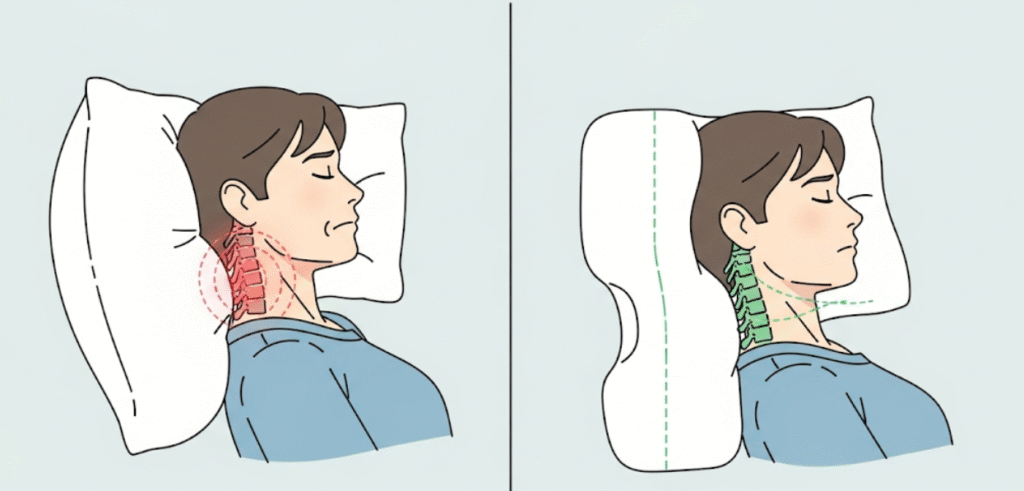Neck pain is no joke; unless you consider the “funny bone” analogy, neck pain hits much harder than a stray joke. Your choice of pillow can affect how well you sleep at night and how much better or worse your neck discomfort gets. This article explores in detail about pillows for neck pain and gives you scientifically proven suggestions on how to sleep better and wake up without pain.
Check here for articles related to cervical pillow:
What Causes Neck Pain Related to Sleep?
Neck pain during sleep is often caused by poor spinal alignment or muscle strain from incorrect pillow use [1]. The neck is the most valuable part of your spine; if the pillow does not support it properly, you can wake up in the morning with a stiff neck. Common culprits for such issues include:
- Unsupported neck curvature.
- Using a pillow that’s too flat or too firm.
- Sleeping in awkward positions.
How a Pillow Can Affect Neck Pain Relief and Sleep Quality?
Pillows are not just comfy headrests; they are the unsung heroes that keep your cervical spine aligned while you dream away. An appropriate pillow reduces pressure on neck tissues and improves blood flow, speeding recovery [2]. So, choosing the right pillow is not just aesthetically pleasing, it is a literal pain relief strategy.
Types of Pillows for Neck Pain: What Works Best?
Cervical Pillow: Specialized Neck Support
Cervical pillows are contoured pillows designed to cradle the neck’s natural curve, offering specialized support. Think of it as the VIP treatment your neck deserves. Benefits include:
- Reducing morning stiffness and neck aches.
- Promoting proper spinal alignment throughout the night.
Moreover, spinal alignment provided by cervical pillows helps reduce pressure between the discs in your neck. This means your neck muscles get a much-needed break overnight, and blood flows more easily to those muscles, helping them relax and wake up less cranky. Plus, the smart designs of some cervical pillows even help keep your airway open, so you are less likely to snore or wake yourself up; bonus points for your sleep partner!
Orthopaedic Pillow for Neck Pain: Benefits and Features
Orthopaedic pillows focus on ergonomic design to maintain cervical spine alignment and relieve pressure points. Here are its key features:
- Designed like ergonomic chairs but for your head and neck.
- Clinically proven to improve neck posture and reduce pain [3].
Patients said they had less pain and slept better after using orthopaedic pillows on a regular basis that were made just for their neck postures. So, it is not just a beautiful cushion; rather, it is like having a neck chiropractor right next to your bed, but without the need of having awkward small talk and giving hourly fees.
Memory Foam Pillow for Neck Pain: Contouring Comfort
Memory foam molds to your head and neck contours, providing uniform support. Think of it as a custom-tailored suit for your neck. Good features include:
- Even pressure distribution.
- Adaptable firmness for personalized comfort.
- Popular for reducing neck pain [4].
Many users rave about waking up without that dreaded morning neck ache; it is like your neck finally gets the hug it deserves after a long day!
Water Pillow for Neck Pain: Adjustable Support and Cooling Effect
Water pillows allow you to fine-tune the firmness to your liking and offer cooling benefits. Ideal for those who:
- Experience variable neck pain intensities.
- Enjoy a cool sleeping surface.
- Need adjustable support levels.
Research shows that water pillows significantly reduce morning neck pain and improve overall sleep quality compared to traditional pillows [5]. So, it is like having a pillow that’s both supportive and forgiving; sort of like that one friend who always has your back, literally!
Contour Pillow for Neck Pain: Ergonomic Design for Spinal Alignment
Contour pillows have a wave-like shape to support head and neck ergonomically, especially beneficial for:
- Side sleepers and back sleepers.
- Maintaining natural spinal curves.
- Preventing neck stiffness.
When pillow height and shape are just right, they can meaningfully reduce neck pain and stiffness over time, especially in people who struggle with chronic discomfort [6]. Plus, the ergonomic design can ease tension in your shoulders and upper back.
Neck Support Pillow: Extra Cushioning for Stiff Necks
Provides additional cushioning to:
- Relieve muscle stiffness.
- Support prolonged neck comfort, especially useful if you wake up stiff regularly.
Additionally, for those who spend a lot of time hunched over screens or desks, a good neck support pillow can be a game-changer in preventing that stiffness from developing in the first place.
How to Choose the Best Pillow for Neck Pain?
Factors to Consider: Loft, Firmness, and Material
Before we get into the minute details, we need to understand the primary job of a pillow. The pillow is used so that the neck stays in its natural position and stays aligned with the spine. Getting these basics wrong will produce counter-effective results and a discomfort that might haunt you the entire day. A pillow cannot be only judged by its look and feel – just like we don’t judge a book by its cover (Lame joke). Effectiveness of a pillow depends on how it adjusts with our body weight and shape because these are the factors which, overtime, influence the sleep quality and neck support. For example, a pillow that gives immediate gratification of softness and overtime causes neck pain as it fails to support the neck properly. So, the conclusion here is that the process of choosing a pillow starts with understanding our body’s unique needs.

Hence, consider the following factors when selecting a pillow:
- Loft: The height should fill the gap between your neck and bed without bending your neck awkwardly.
- Firmness: Too firm causes pressure points; too soft offers no support.
- Material: Memory foam, latex, water, or hybrid; choose what suits your comfort and neck condition.
Pillow Loft for Neck Pain: Why Height Matters?
While deciding on the pillow’s loft we need to ensure that it fills the entire space between our neck and the mattress – that’s how we ensure that the neck’s natural position is retained. A pillow’s ideal loft varies for people with different preferred sleeping positions. For example, someone who prefers sleeping to a side will need a higher loft than someone who is a back sleeper. Similarly, folks who are stomach sleepers need a much thinner pillow or can even decide to sleep without a pillow so that there is no undue stress on their neck. These are the simple ways to choose and get the best out of your pillow.
Matching Pillows to Your Sleeping Position (Back, Side, Stomach)
Say goodbye to one-size-fits-all! Here’s why:
- Side sleepers: Side sleepers benefit from firm, high-loft pillows because they fill the space between the neck and mattress, keeping everything aligned like a well-oiled machine.
- Back sleepers: These sleepers need a pillow with medium firmness and loft to cradle the neck and head gently without pushing too hard or sagging too much.
- Stomach sleepers: Minimal pillow or thin pillow used to avoid neck hyperextension.
Moreover, tailoring your pillow loft to your sleep posture is a vital step toward waking up refreshed and pain-free.
Special Considerations: Pillow for Cervical Spondylosis
What is Cervical Spondylosis and How Does It Cause Neck Pain?
Cervical spondylosis is basically arthritis of the neck vertebrae that causes stiffness and pain, especially with age. It narrows the spinal canal, causing nerve irritation [7]. Think of it as a traffic jam in your neck’s nerve highway.
Best Pillow Choices for Managing Cervical Spondylosis Symptoms?
- Use cervical or orthopaedic pillows offering precise neck support.
- Avoid overly soft pillows that compress sensitive areas.
- Consider layering with neck rolls or heat packs for enhanced relief.
Tips for Using Your Pillow to Maximize Neck Pain Relief
Correct Pillow Positioning Techniques
How you place your pillow can be as important as which pillow you use. Here are the techniques that you should follow for a better sleep:
- Support your neck, not just your head.
- Keep your neck aligned with your spine horizontally.
- Avoid sleeping with your head tilted or on multiple pillows.
Daily Habits and Sleep Tips for Better Neck Support
Healthy neck sleep is not just about pillows. You need to develop some healthy habits as well. Check the methods below:
- Raise screens to eye level to avoid forward head posture.
- Skip holding your phone against your shoulder while texting.
- Practice gentle neck stretches before bed.
Myths vs Facts: What You Need to Know About Pillows and Neck Pain
Common Pillow Myths Debunked
- Myth: Fluffier pillows are better.
Fact: Too soft often means no support, worsening pain. - Myth: One pillow fits all.
Fact: Pillow choice is highly individual, based on sleep position and symptoms.
Scientific Evidence Supporting Proper Pillow Use for Neck Pain
Studies confirm users experience improved pain and mobility with pillows tailored for cervical support versus generic options [8]. Research published in the Journal of Physical Therapy Science demonstrated that customized cervical pillows decrease muscle tension and enhance range of motion. Additionally, comparative trials reveal that cervical pillows outperform standard pillows in reducing both acute and chronic neck discomfort, supporting their targeted therapeutic benefits [9].
Caring for Your Pillow and When to Replace It
How to Maintain Your Pillow for Longevity and Hygiene?
- Wash pillow covers weekly.
- Fluff pillows daily to maintain shape.
- Air out pillows regularly to reduce allergens.
Signs Your Pillow May Be Causing or Worsening Neck Pain
- Noticeable lumps or misshapen pillows.
- Waking up with neck stiffness or headaches.
- Loss of support during sleep.
Ending Note
In addition to the comfort, the matter of choosing the most appropriate pillow for neck pain is important to your long-term health and your sleeping quality. Never ruin your sleep because of a wrong pillow. A right pillow can transform your life and it is better to research various types of pillows, be attentive to your body and prioritize the health of your neck and spine.
Check for more:
- Car Seat Cushions That Reduce Long Drive Fatigue and Back Pain
- 5 Best Back Support Cushions
- Science Behind Ergonomic Lumbar Cushions
Frequently Asked Questions About Pillow for Neck Pain
1. Does sleeping with a pillow help with neck pain?
Every pillow is different. The best cushion for neck pain is one that fits the curvature of your spine and the way you sleep.
2. Is it always better to use a memory foam pillow?
People enjoy memory foam for a reason, but not everyone can use it to its full potential. The symptoms of a person can determine if they favour contoured or water pillows.
3. How Often Should I Change My Pillow?
Experts recommend replacing pillows every 1–2 years or when support diminishes or allergies surface.
4. What Pillow Loft is Ideal for Neck Pain?
It depends on your sleep position; side sleepers need taller pillows, back sleepers medium, and stomach sleepers the thinnest.
5. How Do I Properly Care for and Clean My Neck Pillow?
Washing instructions depend on the material. Always check manufacturer guidelines, avoid harsh detergents, and allow pillows to air dry thoroughly to prevent mold and maintain longevity.
References
- Yim, J. E. (2015). Optimal pillow conditions for high-quality sleep: a theoretical review. Indian Journal of Science and Technology, 8(S5), 135. DOI: 10.17485/ijst/2015/v8iS5/62330
- Zhang, J., Zhang, Q., Wang, Y., & Qiu, C. (2013, April). A real-time auto-adjustable smart pillow system for sleep apnea detection and treatment. In Proceedings of the 12th international conference on Information processing in sensor networks (pp. 179-190). https://doi.org/10.1145/2461381.2461405
- Kiatkulanusorn, S., Suato, B. P., & Werasirirat, P. (2021). Analysis of neck and back muscle activity during the application of various pillow designs in patients with forward head posture. Journal of Back and Musculoskeletal Rehabilitation, 34(3), 431-439. https://doi.org/10.3233/BMR-200038
- Soal, L. J., Bester, C. M., Shaw, B. S., & Yelverton, C. (2019). Changes in chronic neck pain following the introduction of a visco-elastic polyurethane foam pillow and/or chiropractic treatment. Health SA Gesondheid, 24. https://www.ajol.info/index.php/hsa/article/view/193831
- Daryushi, S., Allahyari, T., & Karimi, Z. (2025). The Influence of Pillow Shape and Content on Neck Muscular Activity and Perceived Comfort. The Open Public Health Journal, 18(1). DOI: 10.2174/0118749445371712250130065843
- Lee, J. H., Shin, J. S., Yoo, H. K., Lee, J., Lee, Y. J., Kim, M. R., … & Ha, I. H. (2016). Short-term effects of a functional cervical pillow on inpatients with neck discomfort: a randomized controlled trial. Int J Clin Exp Med, 9(6), 11397-408. https://e-century.us/files/ijcem/9/6/ijcem0025888.pdf
- Ravisankar, P., Manjusha, K., Sri, V. L., Lakshmi, K. R., Kumar, B. V., Pragna, P., … & Babu, P. S. (2015). Cervical spondylosis-Causes and remedial measures. Journal of Pharmaceutical Research, 5(08). https://www.researchgate.net/profile/Ravi-Sankar-24/publication/340871919_CERVICAL_SPONDYLOSIS_-CAUSES_AND_REMEDIAL_MEASURES/links/5ea1c19e458515ec3a02c0ce/CERVICAL-SPONDYLOSIS-CAUSES-AND-REMEDIAL-MEASURES.pdf
- Pagliari, C., Montalti, A., Frizziero, L., & Liverani, A. (2025). Enhancing ergonomic comfort: A study on customized cushion design using 3D scanning and additive manufacturing. Results in Engineering, 25, 104256. https://doi.org/10.1016/j.rineng.2025.104256
- Zhang, P., Li, W., Shang, Y., Li, J., Zhou, C., & Lei, J. (2025). Effect of interference electrotherapy combined with rotary traction manipulation on cervical function and recurrence in patients with cervical spondylotic radiculopathy. American Journal of Translational Research, 17(2), 1005. doi: 10.62347/BMNP8126























